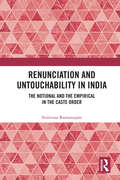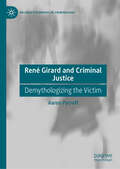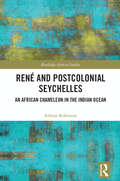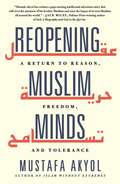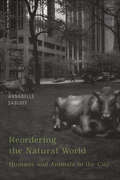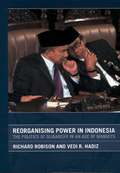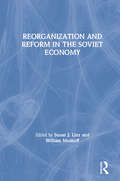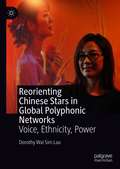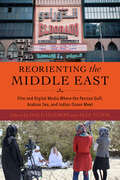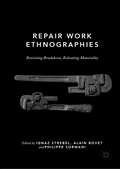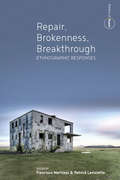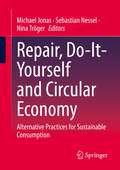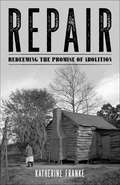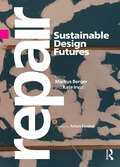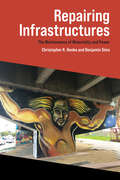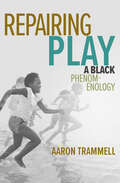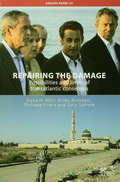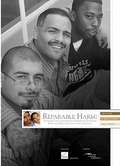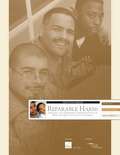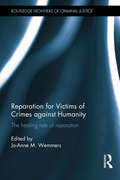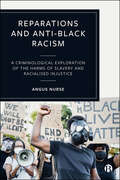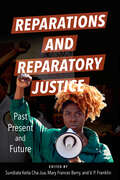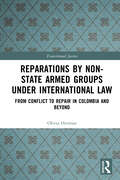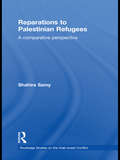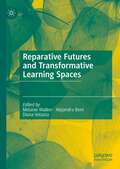- Table View
- List View
Renunciation and Untouchability in India: The Notional and the Empirical in the Caste Order
by Srinivasa RamanujamThis volume develops a historically informed phenomenology of caste and untouchability. It explores the idea of ‘Brahmin’ and the practice of untouchability by offering a scholarly reading of ancient and medieval texts. By going beyond the notions of purity and pollution, it presents a new framework of understanding relationships between social groups and social categories. An important intervention in the study of caste and untouchability, this book will be an essential read for the scholars and researchers of political studies, political philosophy, cultural studies, Dalit studies, Indology, sociology, social anthropology and Ambedkar studies.
René Girard and Criminal Justice: Demythologizing the Victim (Palgrave Pioneers in Criminology)
by Aaron PycroftThis book highlights the significance of René Girard's work for key criminological debates to provide new perspectives. Girard explores the causes of violence in humans and his work is used to interpret cultural phenomena related to criminology and victimology. The book focuses in particular on Girard’s cultural anthropology of the victim as being foundational to social order. The scapegoat mechanism, as developed by Girard, is an anthropological reading of myth which provides a site of rich dialogue with criminology, victimology, theology and philosophy. The book explores how this provides readers with ontological, epistemological and methodological tools for both explaining and changing the practices of justice.
René and Postcolonial Seychelles: An African Chameleon in the Indian Ocean (African Studies)
by Ashton RobinsonRobinson details the life and times of France-Albert René (1935–2019), the second post-independence leader of Seychelles who oversaw the nation’s transition to democracy after over a decade of his brutal dictatorship.René’s career was Seychelles’ history over the forty-three years from independence in 1976 until his peaceful death. Having seized power in a violent coup he presented himself as a socialist in the Cold War but transitioned to build Africa’s most successful relationship with international lenders and developed Seychelles as a major offshore tax haven. He also sustained and cultivated Seychelles’ position as a Western tourism-based economy. Robinson outlines not only René’s use of political violence and extrajudicial killing but also his unique relationship with transnational, organised crime including his links with the New York mafia, Italian organised crime interests and even helping to arm the Rwandan genocide. Nevertheless, René – a white leader of an African nation – avoided the self-isolation of Rhodesia and South Africa; endowed racial harmony; enabled women to advance politically and socially; and left Seychelles with high incomes, currency convertibility, and robust human and physical infrastructure.This is an essential read for anyone with an interest in the history of Seychelles, which will also be of great value to scholars of postcolonial states, African studies, microstates and the Indian Ocean region.
Reopening Muslim Minds: A Return to Reason, Freedom, and Tolerance
by Mustafa AkyolA fascinating journey into Islam's diverse history of ideas, making an argument for an "Islamic Enlightenment" todayIn Reopening Muslim Minds, Mustafa Akyol, senior fellow at the Cato Institute and opinion writer for The New York Times, both diagnoses “the crisis of Islam” in the modern world, and offers a way forward. Diving deeply into Islamic theology, and also sharing lessons from his own life story, he reveals how Muslims lost the universalism that made them a great civilization in their earlier centuries. He especially demonstrates how values often associated with Western Enlightenment — freedom, reason, tolerance, and an appreciation of science — had Islamic counterparts, which sadly were cast aside in favor of more dogmatic views, often for political ends. Elucidating complex ideas with engaging prose and storytelling, Reopening Muslim Minds borrows lost visions from medieval Muslim thinkers such as Ibn Rushd (aka Averroes), to offer a new Muslim worldview on a range of sensitive issues: human rights, equality for women, freedom of religion, or freedom from religion. While frankly acknowledging the problems in the world of Islam today, Akyol offers a clear and hopeful vision for its future.
Reordering the Natural World: Humans and Animals in the City
by Annabelle SabloffIn Reordering the Natural World, Annabelle Sabloff argues that the everyday practices of contemporary capitalist society reinforce the conviction that we are profoundly alienated from the rest of nature. At the same time, she reveals the often disguised affinities and sense of connection urban Canadians manifest in their relations with animals and the natural world.Sabloff reflects on how the discipline of anthropology has contributed to the prevailing Western perception of a divide between nature and culture. She suggests that the present ecological crisis has resulted largely from the ways in which Western societies have construed nature as a cultural system. Since new ideas about nature may be critical in changing humanity's destructive interactions with the biosphere, Reordering the Natural World is invaluable in exploring how urban Canadians develop and sustain their current relationship with the macrocosm, and in considering whether these relationships might be altered by reconceptualizing anthropology itself as an integral part of natural history. With this unique text, Sabloff not only provides provocative insight into the study of relations between humans and the natural world, she lays the cornerstone for building an entirely new structure for the study of anthropology itself.
Reorganising Power in Indonesia: The Politics of Oligarchy in an Age of Markets (Routledge/City University of Hong Kong Southeast Asia Series)
by Vedi Hadiz Richard RobisonReorganising Power in Indonesia is a new and distinctive analysis of the dramatic fall of Soeharto, the last of the great Cold War capitalist dictators, and of the struggles that reshape power and wealth in Indonesia. The dramatic events of the past two decades are understood essentially in terms of the rise of a complex politico-business oligarchy and the ongoing reorganisation of its power through successive crises, colonising and expropriating new political and market institutions. With the collapse of authoritarian rule, the authors propose that the way was left open for this oligarchy to reconstitute its power within society and the institutions of newly democratic Indonesia.
Reorganization and Reform in the Soviet Economy
by William Moskoff Susan J. LinzRichly represented in the Russian folktale tradition, the legends in this work are religious tales in a peasant village setting. Among the standard themes is the return of Christ, who wanders through rural Russia with his disciples. Satan appears too, as do a cast of spirits and lesser devils.
Reorienting Chinese Stars in Global Polyphonic Networks: Voice, Ethnicity, Power
by Dorothy Wai LauThis monograph offers a cutting edge perspective on the study of Chinese film stars by advancing a “linguaphonic” model, moving away from a conceptualization of transnational Chinese stardom reliant on the centrality of either action or body. It encompasses a selection of individual personalities from the most iconic Bruce Lee, Michelle Yeoh, and Maggie Cheung to the not-yet-full-fledged Takeshi Kaneshiro, Jay Chou, and Tang Wei to the newest Fan Binging, Liu Yifei, Wen Ming-Na, and Sammi Cheng who are exemplary to the star-making practices in the designated sites of articulations. This volume notably pivots on specific phonic modalities – spoken forms of tongues, manners of enunciation, styles of vocalization -- as means to mine ethnic and ideological underpinnings of Chinese stardom. By indicating a methodological shift from the visual-based to aural-based vectors, it asserts the phonic as a legitimate bearing that can generate novel vigor in the reimagination of Chineseness. By exhausting the critical affordability of the phonic, this book unravels the polemics of visuality and aurality, body and voice, as well as onscreen personae and offscreen existence, remapping the contours of the ethnic fame-making in the global mediascape.
Reorienting the Middle East: Film and Digital Media Where the Persian Gulf, Arabian Sea, and Indian Ocean Meet
by Alia Yunis Nelida Fuccaro Dale Hudson Kay Dickinson Sean Foley Firat Oruc Ammar Al Attar Bindu Menon Parisa Vaziri Sebastian Thejus Cherian Karolina Ginalska Suzi Mirgani Chrysavgi Papagianni Elizabeth Derderian Sascha RitterStories of desert landscapes, cutting-edge production facilities, and lavish festivals often dominate narratives about film and digital media on the Arabian Peninsula. However, there is a more complicated history that reflects long-standing interconnections between the Persian Gulf, Arabian Sea, and Indian Ocean. Just as these waters are fluid spaces, so too is the flow of film and digital media between cultures in East Africa, Europe, North Africa, South Asia, Southwest Asia, and Southeast Asia.Reorienting the Middle East examines past and contemporary aspects of film and digital media in the Gulf that might not otherwise be apparent in dominant frameworks. Contributors consider oil companies that brought film exhibition to this area in the 1930s, the first Indian film produced on the Arabian Peninsula in the late 1970s, blackness in Iranian films, the role of Western funding in reshaping stories, Dubai's emergence in global film production, uses of online platforms for performance art, the development of film festivals and cinemas, and short films made by citizens and migrants that turn a lens on racism, sexism, national identity, and other rarely discussed social issues.Reorienting the Middle East offers new methods to analyze the often-neglected littoral spaces between nation-states and regions and to understand the role of film and digital media in shaping dialogue between area studies and film and media studies. Readers will find new pathways to rethink the limitations of dominant categories and frameworks in both fields.
Repair Work Ethnographies: Revisiting Breakdown, Relocating Materiality
by Philippe Sormani Ignaz Strebel Alain BovetThis pioneering book homes in on repair as an everyday practice. Bringing together exemplary ethnographies of repair work around the world, it examines the politics of repair, its work settings and intricate networks, in and across a wide range of situations, lay and professional. The book evidences the topical relevance of situated inquiry into breakdown, repair, and maintenance for engaging with the contemporary world more broadly. Airplanes and artworks, bicycles and buildings, cars and computers, medical devices and mobile phones, as virtually any commodity, infrastructure or technical artifact, have in common their occasional breakdown, if not inbuilt obsolescence. Hence the point and purpose of closely examining how and when they are fixed.
Repair, Brokenness, Breakthrough: Ethnographic Responses (Politics of Repair #1)
by Francisco Martínez Patrick LavioletteWhat does it mean to claim that something is broken? What is the connection between tinkering and innovation? And how much tolerance for failure do our societies have? Exploring some of the ways in which repair practices and perceptions of brokenness vary culturally, Repair, Brokenness, Breakthrough argues that repair is an attempt to extend the life of things as well as an answer to failures, gaps, wrongdoings and leftovers. The set of contributions illustrates the strong affective power hidden in situations of disrepair and repair; broken objects often bring strong emotions into play, but also energising reactions of creative action.
Repair, Do-It-Yourself and Circular Economy: Alternative Practices for Sustainable Consumption
by Michael Jonas Nina Tröger Sebastian NesselRepair & Do-It-Yourself activities on the one hand and discussions about the circular economy on the other hand are currently regarded as promising examples of how current modes of consumption and production can be reorganized and redesigned in the sense of a sustainable society. This volume discusses the relevance, the interactions as well as the possibilities and limits of the aforementioned phenomena of repairing, do-it-yourself and longer use on the one hand and the circular economy on the other, from both a scientific and a practical perspective.
Repair: Redeeming the Promise of Abolition
by Katherine FrankeA compelling case for reparations based on powerful, first-person accounts detailing both the horrors of slavery and past promises made to its survivors.Katherine Franke makes a powerful case for reparations for Black Americans by amplifying the stories of formerly enslaved people and calling for repair of the damage caused by the legacy of American slavery. Repair invites readers to explore the historical context for reparations, offering a detailed account of the circumstances that surrounded the emancipation of enslaved Black people in two unique contexts, the Sea Islands of South Carolina and Davis Bend, Mississippi, Jefferson Davis’s former plantation. Through these two critical historical examples, Franke unpacks intergenerational, systemic racism and white privilege at the heart of American society and argues that reparations for slavery are necessary, overdue and possible.Praise for Repair“Essential . . . Franke engages the original debates concerning the conditions upon which newly freed Black people would rebuild their lives after slavery. Franke powerfully illustrates the repercussions of the unfilled promise of land redistribution and other broken promises that consigned African Americans to another one hundred years of second-class citizenship. Franke passionately argues that the continuation of those vast disparities between Black and white people in U.S. society—a product of slavery itself—means that the struggle for reparations remains a relevant demand in the current movements for racial justice.” —Keeanga-Yamahtta Taylor, author of From #BlackLivesMatter to Black Liberation“Repair revisits the revolutionary era of Reconstruction . . . when the redistribution of land and wealth as recompense for unrequited toil could have secured genuine freedom for Black people rather than a future of racial inequality, exploitation, marginalization, and precarity . . . . Franke makes a persuasive case for reparations as at least a first step toward creating the conditions for genuine freedom and justice, not only for African Americans but for all of us.” —Robin D. G. Kelley, author of Freedom Dreams: The Black Radical Imagination“Katherine Franke argues for a type of Black freedom that is material and felt—freedom that is more than a poetic nod to claims of American moral comeuppance. Repair . . . is a critical text for our times that demands an honest reckoning with the consequences, and afterlife, of the sin that was chattel enslavement. It is bold call for reparations and costly atonement.” —Darnell L. Moore, author of No Ashes in the Fire: Coming of Age Black & Free in America“Katherine Franke is consistently one of the sharpest, most conscientious thinkers in progressive politics. In a time defined by crisis and conflict, Katherine is among that small number of thinkers whom I find indispensable.” —Jelani Cobb, New Yorker columnist and author of The Substance of Hope
Repair: Sustainable Design Futures
by Markus Berger Kate IrvinA collection of timely new scholarship, Repair: Sustainable Design Futures investigates repair as a contemporary expression of empowerment, agency, and resistance to our unmaking of the world and the environment. Repair is an act, metaphor, and foundation for opening up a dialogue about design’s role in proposing radically different social, environmental, and economic futures. Thematically expansive and richly illustrated, with over 125 visuals, this volume features an international, interdisciplinary group of contributors from across the design spectrum whose voices and artwork speak to how we might address our broken social and physical worlds. Organized around reparative thinking and practices, the book includes 30 long and short chapters, photo essays, and interviews that focus on multiple responses to fractured systems, relationships, cities, architecture, objects, and more. Repair will encourage students, academics, researchers, and practitioners in art, design and architecture practice and theory, cultural studies, environment and sustainability, to discuss, engage, and rethink the act of repair and its impact on our society and environment.
Repairing Infrastructures: The Maintenance of Materiality and Power (Infrastructures)
by Christopher R. Henke Benjamin SimsAn investigation of the causes and consequences of the strange, ambivalent, and increasingly central role of infrastructure repair in modern life.Infrastructures--communication, food, transportation, energy, and information--are all around us, and their enduring function and influence depend on the constant work of repair. In this book, Christopher Henke and Benjamin Sims explore the causes and consequences of the strange, ambivalent, and increasingly central role of infrastructure repair in modern life. Henke and Sims offer examples, from local to global, to investigate not only the role of repair in maintaining infrastructures themselves but also the social and political orders that are created and sustained through them.
Repairing Play: A Black Phenomenology (Playful Thinking)
by Aaron TrammellA provocative study that reconsiders our notion of play—and how its deceptively wholesome image has harmed and erased people of color.Contemporary theorists present play as something wholly constructive and positive. But this broken definition is drawn from a White European philosophical tradition that ignores the fact that play can, and often does, hurt. In fact, this narrow understanding of play has been complicit in the systemic erasure of Black, Indigenous, and People of Color (BIPOC) from the domain of leisure. In this book, Aaron Trammell proposes a corrective: a radical reconsideration of play that expands its definition to include BIPOC suffering, subjugation, and taboo topics such as torture. As he challenges and decolonizes White European thought, Trammell maps possible ways to reconcile existing theories with the fact that play is often hurtful and toxic.Trammell upends current notions by exploring play&’s function as a tool in the subjugation of BIPOC. As he shows, the phenomenology of play is a power relationship. Even in innocent play, human beings subtly discipline each other to remain within unspoken rules. Going further, Trammell departs from mainstream theory to insist that torture can be play. Approaching it as such reveals play&’s role in subjugating people in general and renders visible the long-ignored experiences of BIPOC. Such an inclusive definition of play becomes a form of intellectual reparation, correcting the notion that play must give pleasure while also recasting play in a form that focuses on the deep, painful, and sometimes traumatic depths of living.
Repairing the Damage: Possibilities and Limits of Transatlantic Consensus (Adelphi series)
by Dana H. Allin Gilles Andréani Gary Samore Philippe ErreraThe damage that has been done to the transatlantic alliance will not be repaired through grand architectural redesigns or radical new agendas. Instead, the transatlantic partners need to restore their consensus and cooperation on key security challenges with a limited agenda that reflects the essential conservatism of the transatlantic partnership during the Cold War and the 1990s. There will inevitably be big challenges, such as the rise of China, where transatlantic disparities in strategic means and commitments preclude any common alliance undertaking. Yet such limits are nothing new. The absence of a common transatlantic commitment to counter-insurgency in Iraq may cause resentments, but so too did the lack of a common commitment to counter-insurgency in Vietnam. This Adelphi Paper suggests ten propositions for future transatlantic consensus – that is to say, ten security challenges for which the allies should be able to agree on common strategies. These run the gamut from an effective strategy to prevent Iran from developing a nuclear weapons capability to transatlantic leadership for international cooperation against global warming. If pursued with seriousness and a reasonable degree of transatlantic unity, these propositions could constitute the foundations of an effective partnership. They are, in the authors’ view, the basis for a consensus on the most pressing security challenges of the twenty-first century. The time is right for this kind of serious rededication to alliance purposes. There has already been some effort to repair the damage; moreover, new leaders are in place or coming to the countries that were major protagonists of the transatlantic crisis: Germany, France, Britain and, in 2009, the United States. It is possible that these four new leaders will be better able to put the disputes of the recent past behind them. This extended essay is a guide to the possibilities, and also the limits, of a new start.
Reparable Harm
by Lois M Davis Dana Scultz M. Rebecca KilburnThe Los Angeles area has the most severe traffic congestion in the United States. Trends in many of the underlying causal factors suggest that congestion will continue to worsen in the coming years, absent significant policy intervention. Excessive traffic congestion detracts from quality of life, is economically wasteful and environmentally damaging, and exacerbates social-justice concerns. Finding efficient and equitable strategies for mitigating congestion will therefore serve many social goals. The authors recommend strategies for reducing congestion in Los Angeles County that could be implemented and produce significant improvements within about five years. To manage peak-hour auto travel, raise transportation revenue, improve alternative transportation options, and use existing capacity more efficiently, they recommend 10 primary strategies: improve signal control and timing; restrict curb parking on busy thoroughfares; implement paired one-way streets; promote ride-sharing, telecommuting, and flexible work schedules; develop a high-occupancy toll-lane network; vary curb-parking rates with demand, enforce the current parking cash-out law; promote deep-discount transit passes; expand bus rapid transit and bus-only lanes; and implement a regionally connected bicycle network. In addition, three recommendations may help, depending on the outcome of current events: evaluate arterial incident management, consider cordon congestion tolls, and levy local fuel taxes to raise transit revenue. Given that some of the recommendations may prove controversial, the authors also outline complementary strategies for building political consensus.
Reparable Harm: Executive Summary
by Lois M. Davis M. Rebecca Kilburn Dana SchultzThe summary discusses some of the greatest disparities for boys and men of color relative to their white counterparts across specific socioeconomic, health, safety, and school readiness indicators in California and provides information about different strategies for reducing the disparities--including effective programs, practices, and policies--that can begin making an important difference in changing the life course of boys and men of color.
Reparation for Victims of Crimes against Humanity: The healing role of reparation (Routledge Frontiers of Criminal Justice)
by Jo-Anne M. WemmersEach year, countless people fall victim to crimes against humanity. These include widespread occurrences of systematic murder, torture, rape, disappearances, forced deportation and political persecution. Crimes against humanity constitute an attack on human dignity and as such they violate the human rights of the victim, as well as the laws of humanity. In recent years, following the creation of the International Criminal Court, there has been a growing interest in the prosecution of offenders and, in particular, in reparation following crimes against humanity. While such measures are meant to provide justice for victims, victims are often forgotten or lost in legal debates about what constitutes reparation and who is eligible to receive it. This book reaches beyond the boundaries of law and psychology and takes a multidisciplinary approach to the question of reparation for victims of crimes against humanity. Law does not take place in a vacuum and it is important to consider the impact of the law on the psychology of the victim, as well as the legal principles themselves. Herein lies the originality of this book, which bridges the gaps between psychology, victimology, criminology and law and will be of key interest to academics and students engaged in the study of these areas.
Reparations and Anti-Black Racism: A Criminological Exploration of the Harms of Slavery and Racialized Injustice
by Angus NurseThe Black Lives Matter movement has exposed the state violence and social devaluation that Black populations continue to suffer. Police shootings and incarceration inequalities in the US and UK are just two examples of the legacy of slavery today. This book offers a criminological exploration of the case for slavery and anti-Black racism reparations in the context of the enduring harms and differential treatment of Black citizens. Through critical analysis of legal arguments and reviewing recent court actions, it refutes the policy perspectives that argue against reparations. Highlighting the human rights abuses inherent to and arising from slavery and ongoing racism, this book calls for governments to take responsibility for the impact of ongoing racialized injustice.
Reparations and Reparatory Justice: Past, Present, and Future
by V. P. Franklin Mary Frances Berry Chuck Collins Danny Glover Brian Jones Charles P. Henry Earl Ofari Hutchinson James B Stewart Ron Daniels Sundiata Keita Cha-Jua A. J Davis Jesse Jackson Sr Sheila Jackson Lee Kamm Howard Hilary McDonald Beckles National Coalition of Blacks for Reparations in America New Afrikan Peoples Organization/Malcolm X Grassroots Movement Malcolm X Grassroots Movement National African American Reparations Commission Adom Gretachew Dedrick Asante-MuhammadChanges at the global, federal, state, and municipal level are pushing forward the reparations movement for people of African descent. The distinguished editors of this volume have gathered works that chronicle the historical movement for reparations both in the United States and around the world. Sharing a focus on reparations as an issue of justice, the contributors provide a historical primer of the movement; introduce the philosophical, political, economic, legal and ethical issues surrounding reparations; explain why government, corporations, universities, and other institutions must take steps to rehabilitate, compensate, and commemorate African Americans; call for the restoration of Black people’s human and civil rights and material and psychological well-being; lay out specific ideas about how reparations can and should be paid; and advance cutting-edge interpretations of the complex long-lasting effects that enslavement, police and vigilante actions, economic discrimination, and other behaviors have had on people of African descent. Groundbreaking and innovative, Reparations and Reparatory Justice offers a multifaceted resource to anyone wishing to explore a defining moral issue of our time. Contributors: Dedrick Asante-Muhammad, Hilary McDonald Beckles, Mary Frances Berry, Sundiata Keita Cha-Jua, Chuck Collins, Ron Daniels, V. P. Franklin, Danny Glover, Adom Gretachew, Charles Henry, Kamm Howard, Earl Ofari Hutchinson, Jesse Jackson, Sr., Brian Jones, Sheila Jackson Lee, James B. Stewart, the Movement 4 Black Lives, the National African American Reparations Commission, the National Coalition of Blacks for Reparations in America, the New Afrikan Peoples Organization/Malcolm X Grassroots Movement
Reparations by Non-State Armed Groups under International Law: From Conflict to Repair in Colombia and Beyond (ISSN)
by Olivia HermanThis book examines whether and how non-state armed groups might be required to provide reparations for the harm caused by their violations of international law committed during situations of non-international armed conflict.Most of today’s armed conflicts are waged between states and non-state armed groups or between such groups. Societies ravaged by these conflicts endure extensive harm resulting from violations of international humanitarian law and international human rights law. This reality prompts a series of pressing questions. Akin to states, should non-state armed groups be held responsible for making reparation when violating international law? And if so, what measures can these groups take to repair the harm they have caused? The book begins by clarifying if there exists, in contemporary international law, a duty for armed groups to provide reparation. It considers whether non-state armed groups have primary international obligations as distinct duty bearers, and whether reparation can be one of the legal consequences when violating these obligations. Subsequently, the book sheds new light on how non-state armed groups’ duty of reparation can be operationalised in international law. This involves elucidating both the conceptualisation and practical application of this duty. Combining this legal analysis with practical perspectives, the book unveils important insights for international law, drawn from an in-depth analysis of Colombia’s experiences with reparations by armed groups in the context of transitional justice.This book will be of interest to scholars and practitioners working in the fields of international law related to armed conflict, accountability and redress, and transitional justice more broadly.
Reparations to Palestinian Refugees: A Comparative Perspective (Routledge Studies on the Arab-Israeli Conflict)
by Shahira SamyThis book delves into the issue of reparations in relation to Palestinian refugees in their search for a solution to their displacement and dispossession. Highlighting the broad spectrum of reparations available as forms of remedy for a historical injustice, the author probes the reasons behind the failure to reach a reparations agreement till the present day and discusses the significance of issues of apology, recognition and acknowledgement of responsibility. In its approach, the book departs from traditional and modern perceptions of reparations as featuring in international law, history, politics and philosophy. The analysis is focused on a comparative study of two other cases - the German-Jewish reparations agreement of 1952 and the Cypriot conflict - in search of parameters that may constitute a framework to a potential reparations model applicable to the case of Palestinian refugees. When compared to the history of negotiations over reparations in the Israeli-Palestinian case, the findings of the comparison shed light on why reparations are still illusive. The book thus offers an explanation of why reparations to Palestinian refugees have failed, and offers suggestions on how to enhance prospects for reparations to Palestinian displacement and dispossessions. A unique contribution to the study of the Arab-Israeli peace process, this book will be an important reference for scholars of the Arab-Israeli conflict, and for students and scholars of politics, conflict resolution and history.
Reparative Futures and Transformative Learning Spaces
by Melanie Walker Alejandra Boni Diana VelascoThis edited book draws on an international cohort of authors, all working towards sustainable, decolonizing human development for more just futures in a variety of learning spaces. Integrating sustainable human development with ‘reparative futures’, the chapters present diverse examples of how transformative learning spaces can be created through different participatory methodologies and with different stakeholders. The book will be of interest to researchers, graduate students, practitioners and policymakers in the areas of higher education, development studies and transformative innovation.
